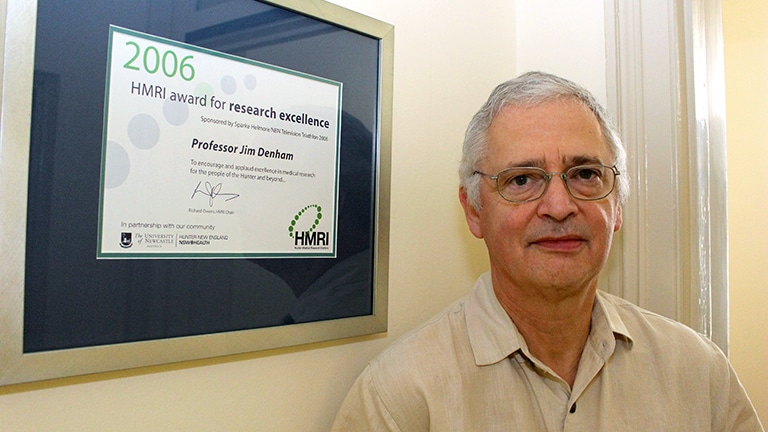
A follow-up study of men 10 years after prostate cancer treatment had surprisingly positive results for quality of life, masculinity and mental health, according to HMRI Cancer researcher Professor Jim Denham.

A new study presented in Adelaide is the first of its kind in Australia and New Zealand to follow-up men and their partners ten years after prostate cancer treatment and determine how the disease has impacted their quality of life, masculinity and mental health.
The research was presented at the Multinational Association of Supportive Care in Cancer (MASCC) conference by HMRI Cancer Program researcher Professor Jim Denham from the University of Newcastle and Calvary Mater Newcastle Hospital. He says the preliminary overall results are surprisingly positive.
“The most surprising result was that men who had been treated for prostate cancer ten years ago had similar quality of life to other men generally – even if they had experienced a relapse. However, the research did uncover some key recurring issues that demonstrate the legacy of treatment.”
The in-depth study from the TROG 03.04 RADAR trial involved a detailed questionnaire of over 200 cancer survivors who were diagnosed and treated ten years previously and 129 of their partners.
The most significant issue that researchers uncovered was that 50 percent of prostate cancer survivors experienced feelings of loss of masculinity.
“The findings of a feeling of loss of masculinity were particularly interesting because it didn’t seem to be linked necessarily to the duration of hormonal treatment. In women’s breast cancers we see body image and feelings of loss of femininity in survivors following treatment – this study appears to verify a similar experience in men,” says Professor Denham.
“40 per cent of prostate cancer survivors experienced varying degrees of urinary incontinence and we found that those who were experiencing major incontinence were more likely to have clinically significant depression. But men who had resilience – who had a sense of purpose or acceptance of what had happened – were less likely to be affected.
“The challenge is how we can support more prostate cancer survivors to become resilient and what support services we can offer them to help them deal with these feelings of lost masculinity.”
The results are being used to develop a world first survivorship score – that will help rate how well cancer patients fare beyond cancer.
Professor Ian Olver, Incoming President, MASCC and meeting co-convenor said that it was a significant study that shed new light on some important issues related to cancer survivorship.
“We know that the side effects associated with cancer don’t stop when treatment does, but there is a gap in terms of support services for those who are longer term cancer survivors. As more and more people survive cancer, it’s increasingly important to have research from large studies that monitor how cancer survivors live later down the track and what support is required.”
HMRI would like to acknowledge the Traditional Custodians of the land on which we work and live, the Awabakal and Worimi peoples, and pay our respects to Elders past and present. We recognise and respect their cultural heritage and beliefs and their continued connection to their land.

Hunter Medical Research Institute
We’re taking healthy further.
Locked Bag 1000
New Lambton
NSW, Australia, 2305



This site is protected by reCAPTCHA and the Google Privacy Policy and Terms of Service apply.
Copyright © 2024 Hunter Medical Research Institute | ABN: 27 081 436 919
Site by Marlin Communications
